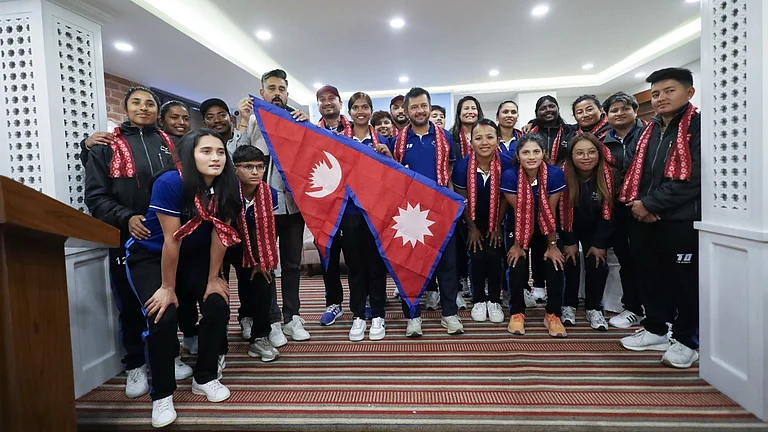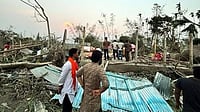The explicit void of the mobile screen haunted me. The last undelivered message was grinning alone. The absence of the warm comforting feeling of the dearest friend's anxious waiting for me was so poignant that it was pushing me into a state of restlessness before slipping into a blackhole of a concoction of guilt and longing. And when the silence was not chosen but rather imposed on, it became harder to deal with.
On 4th of August, my friend Raqif, whom I met on Instagram, asked me for dua (prayer) for him as he had his law exam on the 5th. But the sudden declaration of the abrogation of Article 370, followed by mobile network suspension, brought a halt to our daily chats. Though he was much younger than me, his kindness and magnanimity never stood in the way of our friendship.
Our endless chat about the works of Arundhati Roy made us glued to each other. But from the 5th of August, 2019, it was complete silence. The initial restless frustration sunk into a deep helpless and intense worry of many ifs and buts.
At such a point, you want the world to stop and listen to or to be pathetic to your pain. But it doesn't happen. This world has a peculiar and indifferent way to move on. On Eid, I missed Raqif more. He had asked me to share pictures of food we make at home.
Though Muslims in India are oppressed by the blanket term 'Muslim', in reality the culture of the Muslim community is as diverse as the idea of India itself. Most of the Muslims in my part of India have never had biryani in their lives. Though we as Muslims are often hailed or nailed for some particular food habits. A North Indian biryani is quite unlike the potato-mixed biryani of Bengal. Quite contrary to the belief of the right-wing narrative, a Bengali Muslim can live without beef but we can hardly manage without fish. So food was another topic of our daily conversation. His haak saag and my favourite hilsa curry were our ways of knowing each other.
Time rolled on. The wound of his absence began to spill blood on my existence. At one point, I thought of writing a letter to him. But then I realised my friend lives in a country without a post office. Poetry and particularly the poetry of Agha Shahid Ali became my resort.
The celebration, the joy at the silence of Kashmir by my part of the land was so deafening that I was trying to find an escape route from the gnawing guilt. I picked up a pen and began to scribble myself.
What could I write but an address to my friend, Raqif? I started to write with the desperation to make him know that I am not that India who is jubilant at his pain. Have I succeeded? To know the answer to it, one must find out the answer to this question: "Can an oppressor and an oppressed be friends?”
To be a friend, we have to walk many miles and as a poet, what can be a better road than poetry? And walking on this road, I got my first book The Musings of the Dark.

I heard his voice again after five months at the end of January. I asked him how did he survive so many months without the internet, without a phone call? He smiled and said, "We are Kashmiris, we survive."
The weight behind his words was heavy enough and I couldn't ask him if we were still friends. I just sent him my poems.
Have the poems reached the country without a post office or are the poems still wandering around barbed wires and frisking hands of the khakis? If you —the readers— ever manage to reach my friend's land, please hand over these poems to him:
1. To my friend who lives in an imposed graveyard
I don't want to say you sorry
I should not be
Scissoring your arms and heart
can't be pardoned.
Raqif, will you walk with me?
Oh, how can you?
I have tied your hands and legs
I have fed you bullets.
What will you spit out,
blood or bullets?
Forgive me, Raqif
I dream of talking with you
among the falling leaves of the chinar trees.
Will you still teach me Urdu?
The Jhelum and the sound of your voice
will make a symphony that I will listen
Sitting on the banks of Jhelum.
Will you still make khewa for me,
with the best saffron strand?
Please Raqif, my friend,
forgive me and be my friend forever.
Please once again read to me
the nazms of Faiz.
Don't let the fascists dictate our hearts
Let's prove them
The land they can rule but not our hearts.
(A poem from the collection, The Musings of the Dark)
2. I Am Your Enemy, My Friend
I fail in touching your words
that comes alive every time.
I open my heart and the words
leave for me the stinks
of the blood, betrayal and intestines
that I have earned over the years from your land.
The dark words that I
have injected in your vocabulary
chase me in broad daylight
in my comforting room.
I turn off the light.
They become more luminous in the dark.
Your silent questions haunt
my dead heart for replies.
I turn away my eyes from me.
A murderer looks at others for
reasons for his crime.
How the voices are coming
with weeping noises
and shattered images
after the throat has long been slit!
Wanton brothers throw stones on
placid water.
But the ripples are felt for a long.
(Moumita Alam is a poet from a very remote village in West Bengal, India. Her debut collection of poetry The Musings of the Dark is available on Amazon.)


























